(完整word版)七年级下册英语对话及翻译
(完整word版)最新人教版七年级下册英语单词表
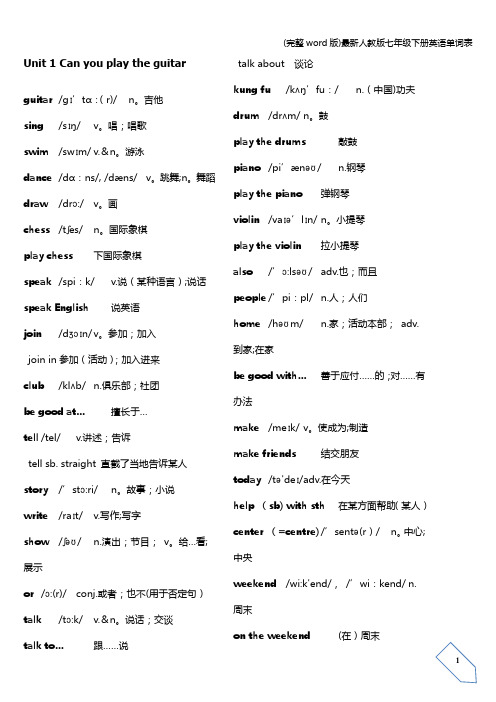
Unit 1 Can you play the guitar guitar/ɡɪ’tɑ:(r)/ n。
吉他sing/sɪŋ/ v。
唱;唱歌swim/swɪm/ v.&n。
游泳dance /dɑ:ns/, /dæns/v。
跳舞;n。
舞蹈draw/drɔ:/ v。
画chess /tʃes/ n。
国际象棋play chess下国际象棋speak/spi:k/ v.说(某种语言);说话speak English说英语join/dʒɔɪn/ v。
参加;加入join in参加(活动);加入进来club/klʌb/ n.俱乐部;社团be good at…擅长于…tell /tel/ v.讲述;告诉tell sb. straight 直截了当地告诉某人story/’stɔ:ri/ n。
故事;小说write/raɪt/ v.写作;写字show/ʃəʊ/ n.演出;节目;v。
给…看;展示or/ɔ:(r)/ conj.或者;也不(用于否定句)talk/tɔ:k/ v.&n。
说话;交谈talk about 谈论kung fu /kʌŋ’fu:/ n.(中国)功夫drum/drʌm/ n。
鼓play the drums 敲鼓piano/pi’ænəʊ/ n.钢琴play the piano 弹钢琴violin/vaɪə’lɪn/ n。
小提琴play the violin拉小提琴also/’ɔ:lsəʊ/ adv.也;而且people /’pi:pl/ n.人;人们home/həʊm/ n.家;活动本部;adv.到家;在家be good with…善于应付……的;对……有办法make/meɪk/ v。
使成为;制造make friends 结交朋友today/tə'deɪ/ a dv.在今天help (sb) with sth在某方面帮助(某人)center (=centre)/’sentə(r)/ n。
(完整word版)初中英语七年级下Unit3SectionB2b参考译文

初中英语七年级下Unit 3 Section B 2b 参考译文Do You Think You Will Have Your Own Robots?你认为你将拥有自己的机器人吗?1. When we watch movies about the future, we sometimes see robots. They are usually like human servants. They help with the housework and do jobs like working in dirty or dangerous places.1. 当我们观看关于未来的电影时,我们有时看到机器人。
它们通常像人类的仆人一样。
它们帮助做家务而且在脏的或者危险的地方工作。
2. Today there are already robots working in factories. Some can help to build cars, and they do simple jobs over and over again. Fewer people will do such jobs in the future because they are boring, but robots will never get bored.2. 现在已经有机器人在工厂工作。
一些机器人可以帮助制造汽车,而且它们可以一遍遍地重复做简单的工作。
将来几乎没有人做这样的工作因为它们很乏味,但机器人从不会觉得厌烦。
3. Scientists are now trying to make robots look like humans and do the same things as we do. Some robots in Japan can walk and dance. They are fun to watch. However, some scientists believe that although we can make robots move like people, it will be difficult to make them really think like a human. For example, scientist James White thinks that robots will never be able to wake up and know where they are. But many scientists disagree with Mr. White. They think that robots will even be able to talk like humans in 25 to 50 years.3 科学家现在正在努力制造一些看上去像人类一样,并且能像我们一样做事情的机器人。
(完整word)鲁教版五四制七年级英语下册课文

Unit 1Do you want to watch a game show?Section A 2dGrace:What did you do in class today,Sarah?Sarah:We had a discussion about TV shows.My classmates like game shows and sports shows.Grace:①Oh,I can't stand them.I love soap operas.②I like to follow the story and see what happens next.Sarah:Well,I don't mind soap operas.But my favorite TV shows are the n ews and talk shows.Grace:They're boring!Sarah:③Well,they may not be very exciting,but you can expect to learn a lot from them.I hope to be a TV r eporter one day.,Section B 2bWhen people say “c ulture”,we think of art and history.①But one very famous symbol in American culture is a cartoon.We all know and love the black mouse with two large round ears—Mickey Mouse.②Over 80 years ago,he first appeared in the cartoon Steamboat Willie.③When this cartoon came out in New York on November 18,1928,it was the first cartoon with sound and music.The man behind Mickey was Walt Disney.④He became very rich and successful.In the 1930s,he made 87 cartoons with Mickey.Some people might ask how this cartoon animal became so popular.One of the main r easons is that Mickey was like a common man,but he always tried to face any danger.⑤In his early films,Mickey was unlucky and had many problems such as losing his house or girlfriend,Minnie.⑥However,he was always ready to try his best.People went to the cinema to see the “little man” win.Most of them wanted to be like Mickey.On November 18,1978,Mickey became the first cartoon character to have a star on the Hollywood Walk of Fame.Peo ple today expect to see more than just a little mouse fighting bad guys,but many still know who he is.Who has a pair of ears more famous than Mickey's?,Unit 2 I'm going to study computer science.Section A 2dAndy:What are you reading,Ken?Ken:The Old Man and the Sea by Hemingway.Andy:Wow,now I know why you'r e so good at writing stories.Ken:Yes,I want to be a writer.Andy:Really?How are you going to become a writer?Ken:①Well,I'm going to keep on writing stories,of course.What do you want to be?Andy:②My parents want me to be a doctor,but I'm not sure about that.Ken:Well,don't worry.Not everyone knows what they want to b e.Just make sure you try your best.Then you can be anything you want!Andy:Yes,you're right.,Section B 2b1.Do you know what a resolution is?It's a kind of promise.①Most of the time,we make promises to other people.(“Mom,I promise I'm going to tidy my room when I get back from school.”)However,promises you make to yourself are resolutions,and the most common kind is New Year's resolutions.The_start_of_the_year_is_often_a_time_for_making_resolutions.②When we make resolutions at the beginning of the year,we hope that we are going to improve our lives.③Some people write down their resolutions and plans for the coming year.This helps them to remember their resolutions.How_about_you_—_will_you_make_any_next_year?2.There are different kinds of resolutions.Some are about physical health.For example,some people promise themselves they are going to start an exercise program or eat less fast food.④Many resolutions have to do with selfimprovement.These are about making yourself a better person.⑤Some people m ight say they are going to take up a hobby like painting or taking photos,or learn to play the guitar.Some resolutions have to do with better planning,like making a weekly plan for schoolwork.For example,a student may have to find more time to study.3.Although there are differences,most resolutions have one thing in common.People hardly ever keep them!There are good reasons for this.Sometimes the resolutions may be too difficult to keep.Sometimes people just forget about them.For this reason,some people say the best resolution is to have no resolutions!Others tell their family and friends about their wishes and plans.,Unit 3 Will people have robots?Section A 2dNick:What are you reading,Jill?Jill:It's a book about the future.Nick:Sounds cool.So what will the future be like?Jill:①Well,cities will be more c rowded and polluted.There will be fewer trees and the environ ment will be in great danger.Nick:That sounds bad!Will we have to move to other planets?Jill:Maybe.But I want to live on the earth.Nick:Me,too.Then what can we do?Jill:②We can use less water and plant more trees.③Everyone should play a part in saving the earth.,Section B 2bDo You Think You Will Have Your Own Robot?When we watch movies about the future,we sometimes see robots.They are usually just like human servants.①They help with the housework and do jobs like working in dirty or dangerous places.②Today there are already robots working in factories.③For example,they can help to build cars,and they do simple jobs over and over again.Fewer people will do such jobs in the future because they are boring,but robots will never get bored.④Some scientists believe that there will be more robots in the future.⑤However,they agree it may take hundreds of years.Scientists are now trying to make robots look like humans and do the same things as us.Some robots in Japan can even walk and dance.These kinds of robots are fun to watch.But scientist James White thinks that it will be difficult for a robot to do the same things as a person.For example,it's easy for children to wake up and know where they are.⑥Mr.White thinks that robots won't be able to do this,but some scientists disagree.They think that robots will even be able to talk like humans in 25 to 50 years.New robots will have many different shapes.Some will look like humans,and others might look like snakes.⑦If buildings fall down with people inside,snake robots will be able to help look for people under the buildings.⑧That may not seem possible now,but computers and rockets seemed impossible 100 years ago.We never know what will happen in the future!Unit 4How do you make a banana milk shake?Section A 2dAnna:Sam,I want to make Russian soup for a party on Saturday.Can you tell me how?Sam:Sure.First,buy some beef,one cabbage,four carrots,three potatoes,five tomatoes and one onion.Then,cut up the vegetables.Anna:What's next?Sam:①Next,put the beef,carrots and p otatoes into a pot and add some water.After that,cook them for 30 minutes.Then,add the cabbage,tomatoes and onion and cook for another 10 minutes.Anna:OK,that's it?Sam:②No,one more thing.③Finally,don't forget to add some salt.,Section B 2bThanksgiving in the United States①In most countries,people usually eat traditional food on special holidays.A special day in the United States is Thanksgiving.There are many reasons for this special day.For some people,it is a time to give thanks for food in the autumn.So it is always on the fourth Thursday in November in the United States.At this time,people also remember the first travelers from England who came to live in America about 500 years ago.②These travelers had a long,hard winter,and many of them died.In the next autumn,they gave thanks for life and food in their new home.③These days,most Americans still celebrate this idea of giving thanks by having a big meal at home with their family.The main dish of this meal is almost always turkey,a large bird.Making a turkey dinnerHere is one way to make turkey for a Thanksgiving dinner.First,mix together some bread pieces,onions,salt and pepper.④Next,fill the turkey with this bread mix.Then,put the turkey in a hot oven and cook it for a few hours.⑤When it is ready,place the turkey on a large plate and cover it with gravy.Finally,cut the turkey into thin pieces and eat the meat with vegetables like carrots and potatoes.,Unit 5 Can you come to my party?Section A 2dJeff:Hey,Nick,can you come to my house on Saturday?My cousin Sam from Xi'an is going to be here.Nick:Oh,Sam!I remember we went bike riding together last fall when he visited you.Jeff:Yes,that's right.Nick:I'd love to come,but I'm afraid I can't.I have an exam on Monday so I must prepare for it.Jeff:That's really too bad!①Oh,but Sam isn't leaving until next Wednesday.②Can you hang out with us on Monday night?Nick:Sure!③Catch you on Monday!Section B 2bHi David,What a great idea!I really like Ms.Steen a lot.She helped me to improve my English so much.I'm sad to see her go,and this party is the best way to say “Thank you and goodbye.” I can help to buy some of the food and drinks.I can also help to bring Ms.Steen to the party.I already have a great idea about how to do that. He WeiHi David,Thanks so much for planning this.I'd love to come to the party,but I'm not available.①My family is taking a trip to Wuhan at the end of this month to visit my aunt and uncle.However,I'd still be glad to help out with any of the party preparations,like planning the games.Let me know if you need my help. JakeDear classmates,As I'm sure you know by now,our favorite teacher,Ms.Steen,is leaving soon to go back to the US.We're very sad that she's leaving because she is a fun teacher.To show how much we're going to miss her,let's have a surprise party for her next Friday the 28th!Can you come to the party?If so,can you help with any of these things?Please tell me by this Friday.1)Buy food and drinks.2) Think of games to play.3) Prepare things we need for the games(glue,paper,pens,...)4)②Bring Ms.Steen to the party without telling her so that she can be surprised.③I look forward to hearing from you all.DavidSection B 3aDear Parents,I would like to invite you to the opening of our new library at No.9 High School.The opening will be on the morning of Wednesday,January 8th at 9:00.After this,you can enjoy our school concert.Then lunch will be in the school hall at 12:00.Please dress smartly.I would also like to invite each parent to bring one book as a gift for the new library.④Please reply in writing to this invitation by Friday,December 20th.Larry SmithHeadmasterUnit 6 If you go to the party,you'll have a great time!Section A 2dJeff:Hey,Ben.For the party next week,should we ask people to bring food?Ben:No,let's order food from a restaurant.If we ask people to bring food,they'll just bring potato chips and chocolate because they'll be too lazy to cook.Jeff:OK.For the games,do you think we should give people some small gifts if they win?Ben:I think that's a great idea!If we do that,more people will want to play the games.Jeff:Yes,the games will be more exciting,too.,Section B 2ba.If people have problems,they should get advice from an expert.b.If people have problems,they should talk to other people.c.①If people have problems,they should try to keep them to themselves.Students these days often have a lot of worries:Sometimes t hey have problems with their schoolwork,and sometimes with their friends.What can they do about this?Some people believe the worst thing is to do ura Mills,a teenager from London,agrees.“Problems and worries are normal in life,” says Laura.“But I think talking to someone helps a lot.②Unless we talk to someone,we'll certainly feel worse.”Laura once lost her wallet,and worried for days.She was afraid to tell her parents aboutit.She even walked three miles to school each day because she didn't have any money.She just kept thinking,“If I tell my parents,they'll be angry!”③In the end,she talked to her parents and they were really understanding.④Her dad said he sometimes made careless mistakes himself.They got her a new wallet and asked her to be more careful.“I will always remember to share my problems in the future!” Laura says.Robert Hunt advises students about common problems.He feels the same way as Laura.“It is best not to run away from our problems.⑤We should always try to solve them.” He thinks the first step is to find someone you trust to talk to.This person doesn't need to be an expert like himself.⑥Students often forget that their parents have more experience than them,and are always there to help t hem.⑦In English,we say that sharing a problem is like cutting it in half.So you're halfway to solving a problem just by talking to someone about it!,Unit 7 What's the matter?Mandy:Lisa,are you OK?Lisa:I have a headache and I can’t move my neck.What should I do?Should I take my temperature? Mandy:No,it doesn’t sound like you have a fever.What did you on eht eweekend?Lisa: I played computer games all weekend.Mandy:That’s probably why.You need to take breaks away from the computer.Lisa: Yeah,I think I sat in the same way for too long without moving.Mandy:I think you should lie down and rest.If your head and neck still hurt tomorrow, then go to a doctor.Lisa:OK.Thanks ,Mandy.He lost His Arm But Is Still ClimbingAron Ralston is an American man who is interested in mountain climbing. As a mountain climber, Aron is used to taking risks. This is one of the exciting things about doing dangerous sports.There were many times when Aron almost lost his life because of accidents. On April 26, 2003, he found himself in a very dangerous situation when climbing in Utah.On that day, Aron’s arm was caught under a 360-Kilo rock that fell on him when he was climbing by himself in the mountains. Because he could not free his arm, he stayed there for five days and hoped that someone would find him. But when his water ran out, he knew that he would have to do something to save his own life. He wasn’t ready to die that day. So he used his knife to cut off half his right arm. Then, with his left arm, he bandaged himself so that he wouldn’t lose too much blood. After that, he climbed down the mountain to find help,After losing his arm, he wrote a book called Between a Rock and Hard Place. This means being in a difficult situation that you can’t seem to get out of. In this book, Aron tells of the importance of making good decisions, and of being in control of one’s life. His love for mountain climbing is so great that he kept on climbing mountains even after this experience.Do we have the same spirit as Aron? Let’s think about it before we find ourselves “between a rock and a hard place”, and before we have to make a decision that could mean life or death.Unit 8 I'll help to clean up the city park?Helen: Hi, Tom. I'm making some plans to work in an old people's home this summer. Tom: Really? I did that last summerHelen: Oh, what did they ask you to help out with?Tom: Mmm… things like reading the newspaper to the old people or just talking to them The told me stories about the past and how things used to be.Helen: That sounds interesting.Tom: Yeah, a lot of old people are lonely. We should listen to them and care for them. Helen: You're right. I mean, we're all going to be old one day, too.I’ll send you a photo of luckyDear Miss Li,I'd like to thank you for giving money to “Animal Helpers”, I’m sure you know that this group was set up to help people like me. You helped to make it possible for me to have Lucky. Lucky makes a big difference to my life. Let me tell you my story.What would it be like to be blind or deaf? Or imagine you can’t walk or use your hands easily. Most people would never think about this, but many people have these difficulties, I can't use my arms or legs well, so normal things like answering the telephone, opening and closing doors or carrying things are difficult for me. Then one day last year, a friend of mine helped me out. She talked to Animal Helpers about getting me a special trained dog. She also thought a dog might cheer me up. I love animals and I was excited about the idea of having a dog.After six months of training with a dog at Animal Helpers, I was able to bring him home. My dog's name is Lucky---a good name for him because I feel very lucky to have him. You see, I'm only able to have a “dog-helper” because of your kindness!Lucky is very clever and understands many English words. He can understand me when I give him orders. For example, I say, “Lucky! get my book,” and he does it at once.Lucky is a fantastic dog. I'll send you a photo of him if you like, and I could show you how he helps me. Thank you again for changing my life.Best wishes,Ben Smith。
(word完整版)七年级下册英语对话及翻译

Unit 1 Can you play the guitar? 你会弹吉他吗?2d Role-play the conversation.Jane: Hi, Bob. What club do you want to join? 你好,鲍勃。
你想参加什么俱乐部?Bob: I want to join a sports club. 我想参加一个体育俱乐部Jane: Great! What sports can you play? 太好了!你会什么运动?Bob: Soccer. 足球。
Jane: So you can join the soccer club. 那你可以参加足球俱乐部。
Bob: What about you? Y ou’re very good at telling stories. You can join the story telling club. 你呢?你很擅长讲故事。
你可以参加讲故事俱乐部。
Jane: Sounds good. But I like to draw, too. 听起来不错。
但我还喜欢画画。
Bob: Then join two clubs, the story telling club and the art club!那你可以参加两个俱乐部,讲故事俱乐部和美术俱乐部!Jane: OK, let’s join now!好,我们现在就去参加!Unit 2 What time do you go to school? 你几点上学?2d Role-play the conversation.Interviewer: Scoot has an interesting job.He works at a radio station.斯哥特有一份有趣的工作。
他在一家广播电台工作。
Scoot,What time is your radio show?斯科特,你的广播节目在几点?Scoot :From twelve o’clock at night to six o’clock in the morning.从晚上十二点到早上六点。
(完整word版)七年级下册英语对话及翻译

Unit 1 Can you play the guitar? 你会弹吉他吗?2d Role-play the conversation.Jane: Hi, Bob. What club do you want to join? 你好,鲍勃。
你想参加什么俱乐部?Bob: I want to join a sports club. 我想参加一个体育俱乐部Jane: Great! What sports can you play? 太好了!你会什么运动?Bob: Soccer. 足球。
Jane: So you can join the soccer club. 那你可以参加足球俱乐部。
Bob: What about you? Y ou’re very good at telling stories. You can join the story telling club. 你呢?你很擅长讲故事。
你可以参加讲故事俱乐部。
Jane: Sounds good. But I like to draw, too. 听起来不错。
但我还喜欢画画。
Bob: Then join two clubs, the story telling club and the art club!那你可以参加两个俱乐部,讲故事俱乐部和美术俱乐部!Jane: OK, let’s join now!好,我们现在就去参加!Unit 2 What time do you go to school? 你几点上学?2d Role-play the conversation.Interviewer: Scoot has an interesting job.He works at a radio station.斯哥特有一份有趣的工作。
他在一家广播电台工作。
Scoot,What time is your radio show?斯科特,你的广播节目在几点?Scoot :From twelve o’clock at night to six o’clock in the morning.从晚上十二点到早上六点。
(word完整版)七年级英语上册翻译句子
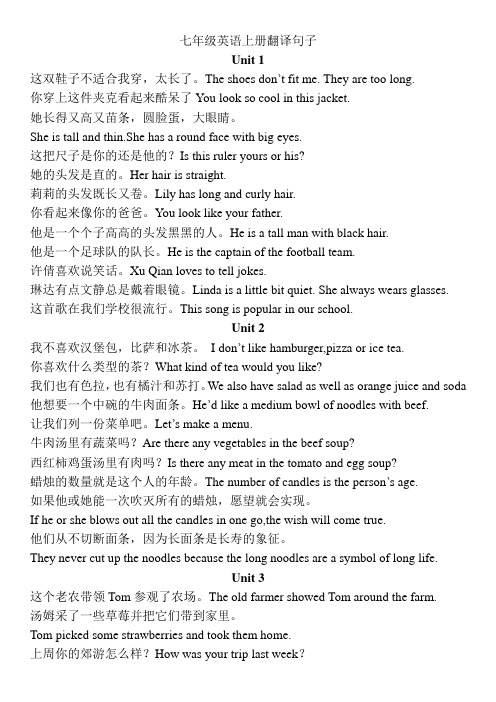
七年级英语上册翻译句子Unit 1这双鞋子不适合我穿,太长了。
The shoes don’t fit me. They are too long.你穿上这件夹克看起来酷呆了You look so cool in this jacket.她长得又高又苗条,圆脸蛋,大眼睛。
She is tall and thin.She has a round face with big eyes.这把尺子是你的还是他的?Is this ruler yours or his?她的头发是直的。
Her hair is straight.莉莉的头发既长又卷。
Lily has long and curly hair.你看起来像你的爸爸。
You look like your father.他是一个个子高高的头发黑黑的人。
He is a tall man with black hair.他是一个足球队的队长。
He is the captain of the football team.许倩喜欢说笑话。
Xu Qian loves to tell jokes.琳达有点文静总是戴着眼镜。
Linda is a little bit quiet. She always wears glasses.这首歌在我们学校很流行。
This song is popular in our school.Unit 2我不喜欢汉堡包,比萨和冰茶。
I don’t like hamburger,pizza or ice tea.你喜欢什么类型的茶?What kind of tea would you like?我们也有色拉,也有橘汁和苏打。
We also have salad as well as orange juice and soda 他想要一个中碗的牛肉面条。
He’d like a medium bowl of noodles with beef.让我们列一份菜单吧。
英语七下鲁教版3a翻译

英语七下鲁教版3a翻译翻译文档概述本文档是对英语七下鲁教版3a课本中所涉及内容的翻译文档。
通过将教材中的英文原文翻译为中文,可以帮助读者更好地理解和掌握课本内容。
本文档采用Markdown文本格式输出,使其易于阅读和使用。
第一单元:Unit 1 My School Day1.1 Lesson 1Title: Welcome to My School!Text:Hi, I’m Jim. I’m twelve. I’m in Class Six, Grade Seven. I have four classes in the morning. They are Chinese, English, math and science. I like English best. There are 50 students in my class. I have lunch at twelve o’clock. I have two classes in the afternoon. They are music and P.E. After that, I go home at four o’clock.Translation:嗨,我是吉姆。
我十二岁。
我在七年级六班。
我上午有四节课。
它们是语文、英语、数学和科学。
我最喜欢英语。
我的班上有50个学生。
我在十二点吃午饭。
下午我有两节课。
它们是音乐和体育课。
之后,我四点回家。
1.2 Lesson 2Title: I Love My School!Text:Our school is big and beautiful. There are some flowers and trees in front of the office building. There is a big playground behind the teaching building. We have PE on the playground. We have Chinese and math classes in the teaching building. We can read books in the library. Our classrooms are big and clean. They’re on the second floor. There are fort y-eight classrooms in our school. There are five grades in our school. They are Grade Seven, Grade Eight, Grade Nine, Grade Ten and Grade Eleven.Translation:我们的学校又大又美。
(完整word版)仁爱版英语七年级下册英语单词总汇表
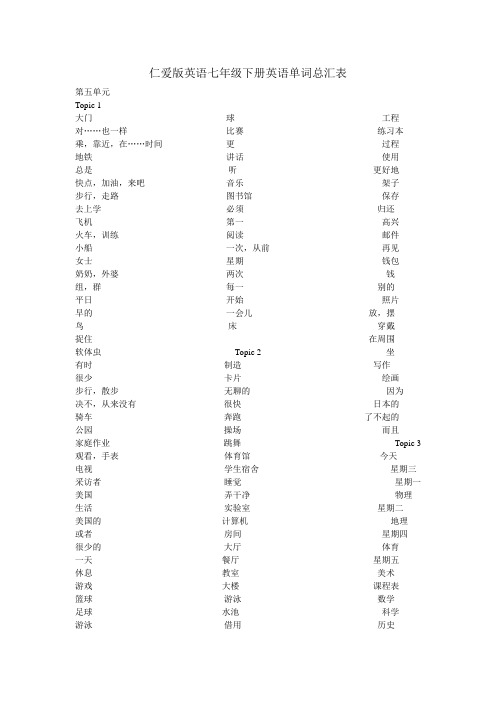
仁爱版英语七年级下册英语单词总汇表第五单元Topic 1大门______ 球________ 工程_____ 对……也一样_______ 比赛________ 练习本____ 乘,靠近,在……时间_______ 更________ 过程_____ 地铁______ 讲话_______ 使用_____ 总是______ 听________ 更好地_____ 快点,加油,来吧_______ 音乐________ 架子_____ 步行,走路______ 图书馆________ 保存_____ 去上学______ 必须_______ 归还______ 飞机______ 第一________ 高兴_____ 火车,训练______ 阅读_______ 邮件_____ 小船_____ 一次,从前_______ 再见_____ 女士______ 星期_______ 钱包_____ 奶奶,外婆_____ 两次______ 钱______ 组,群________ 每一________ 别的______ 平日_____ 开始______ 照片_____ 早的________ 一会儿______ 放,摆______ 鸟_________ 床_______ 穿戴______ 捉住________ 在周围______ 软体虫________ Topic 2 坐______ 有时______ 制造_______ 写作_______ 很少_________ 卡片_______ 绘画_____ 步行,散步_________ 无聊的_______ 因为____ 决不,从来没有_______ 很快_____ 日本的_____ 骑车__________ 奔跑_____ 了不起的_____ 公园________ 操场_____ 而且_____ 家庭作业__________ 跳舞____ Topic 3 观看,手表___________ 体育馆_____ 今天_____ 电视__________ 学生宿舍_____ 星期三_ 采访者_________ 睡觉_______ 星期一美国________ 弄干净_____ 物理__ 生活_________ 实验室______ 星期二____ 美国的________ 计算机______ 地理___ 或者________ 房间_______ 星期四___ 很少的_________ 大厅______ 体育_____ 一天_______ 餐厅_________ 星期五_____ 休息_______ 教室_________ 美术______ 游戏_________ 大楼_________ 课程表_____ 篮球________ 游泳_______ 数学______ 足球_______ 水池________ 科学_____ 游泳________ 借用_______ 历史______生物______ 政治___________ 集会________户外的_________ 活动_____ 功课_______容易的_______ 有趣的________ 难的_________哪一个___ 学科______ 最好的______故事_____ 友好的____ 别的____新闻_______ 注意_______ 在……之间______邮票________ 收集物___ 世界_____星期六_____ 夜间________ 地点_______节目________ 二月________ 报纸________努力的_____ 愿望____第六单元Topic 1花园_____ 卧室_______ 第二_________楼层__________ 到楼上_______ 厨房_________浴室_________ 前面________ 房子_______爷爷________ 在……后面_______ 门_________ 在……附近________ 灯_________ 钟______________ 在……下面__________ 桌子______ 钥匙________离开_______ 东西________ 爸爸___________窗户__________ 模型________ 江河_________中心_________ 院子__________ 美丽的________花___________ 巨大的____________ 左边__________人们_________ 镜子_________ 抽屉_______椅子___________ 键盘__________ 铅笔盒__________ Topic 2排房__________ 农舍_________ 农村___________房间___________ 租用_________ 月份_________夫人____________ 家具__________ 安静的___________ 每一_________ 邻居___________ 商店___________银行_______ 街道__________ 拐角____________书店__________ 博物馆___________ 超市_________车站___________ 邮寄__________ 饭店___________问题_______ 听见______ 钢琴________大声的__________ 真正地_______ 大声地_______阅览室______ 末尾______ 道路________社区_______ 儿童_______ 靠近_________远的___________ 服务________ 地区______停止______ 风扇________ 电话线路__________ 坏的_________ 某一个人__________ 检查________立即______________ 搬家__________ 乡下________城市_________ 喧闹的___________ 交通________费用___________ 思念____________ 新鲜的________城镇__________Topic 3桥___________ 沿着_____________ 和……一起________ 转弯_____ 十字路口_________ 横过__________米_______ 在对面__________ 直到……为止______ 千米__________ 应该__________ 更换________________ 人行道___________ 公共的_________ 灯光____________斑马线___________ 一直地_________ 危险____________安全的___________ 受伤的__________ 失去_________事故__________ 顺服____________ 规则__________符号____________ 在……之前____________ 穿过__________第三__________ 最后_________ 小心的______滑板__________ 票_______ 速度_________ 当……时候__________ 晚的__________ 沿着__________第七单元Topic 1体育运动_____________ 是_____________ 出生_________六月___________ 三月____________ 四月__________五月__________\ 七月___________ 八月_______九月____________ 十月______________ 十一月________十二月__________ 一月___________ 单独的___________千__________ 生日____________ 日期____________计划________ 庆祝_____________ 聚会_______第四_________ 第五__________ 第六________第七__________ 第八_____________ 第九________第十_________ 第十一_____________ 第十二____________第十三_________ 第二十__________ 礼物__________形状__________ 圆圈____________ 从前____________正方形___________ 三角形______________ 长方形_________厘米___________ 足球___________ 特别的_________蜡烛__________ 惊奇________Topic 2表演___________ 芭蕾舞_____________ 鹦鹉________聪明的___________ 点数_____________ 攀登__________猪____________ 乒乓__________ 伦敦__________年龄__________ 任何事物__________ 单词__________意思是________Topic 3朗读_________ 诗____________ 有魔力的________把戏___________ 喜欢_____________ 他自己_________昨天_________ 落下____________ 盥洗室__________发生_______ 站立_____________ 说谎________录像__________ 每人_______________ 真相______________生气的___________ 每个_________ 无声的________刮风__________ 气息__________ 晴朗的_________美味的___________ 音乐的________ 有趣的_____________第八单元Topic 1天气___________ 春天__________ 暖和的________季节__________ 夏天_________ 热的_________冬天___________ 冷的________ 下雨__________下雪__________ 地面__________ 下雨的______多云的___________ 下雪的______ 有风的________多雾的_________ 明亮的_________ 温度_______低,矮_______ 家乡__________ 如果__________旅行________ 穿戴___________ 假日_______澳大利亚________ 记起_________ 大多数的________ 部分_________ 太阳________ 照耀________明亮地_________ 太阳眼镜_______ 短裤________突然______ 文章一段_______ 到达________我们自己_________ 希望__________ 每件事_________大量的________ 收割________ 忙碌的_________叶子__________ 风__________ 强烈的________报道_____________Topic 2一起_____________ 聚会___________ 兴趣_________德国___________ 印度_________ 任何时候_________ 听起来_________ 昂贵的___________ 照相机________帐篷___________ 雨衣__________ 童话书____________ 风俗____________ 进入________ 中断___________潮湿的__________ 指向_________ 触摸__________手指___________ 幸运的__________ 纸_________传递_________ 在……期间_________ 停留________问候___________Topic 3节日_____________ 饺子__________ 圣诞节_______火鸡_________ 灯笼___________ 甜的_____运气________ 谜语________ 南瓜_____果馅饼__________ 前夜_________ 物业________复活节__________ 相信__________ 傻子_______月亮__________ 重要的______________ 准备_______装饰_________ 颜色鲜艳的__________ 教堂__________长筒袜_________ 壁炉__________ 打开________礼品_______ 集会__________ 问候________愉快的__________ 西班牙__________ 葡萄_________蜂蜜________ 事件_______ 开始__________整个的___________ 恐怖的________ 鬼___________敲击__________ 高声呼喊_________ 款待_______国际的________ 劳动__________ 举行_________竞赛__________ 国家的___________ 首都________旗帜___________ 燃烧_______________ 神___________仁爱版英语八年级上册单词总汇表第一单元Topic 1几乎__________ 反对_______________ 学期_____欢呼_________ 队,组_________ 获胜______更喜欢_______ 骑自行车__________ 划船_______相当________ 一点,一些_______ 加入_______俱乐部_______ 溜冰_________ 滑雪______排球___________ 网球_________ 乒乓球_________ 比赛者__________ 梦想___________ 成长_________ 舞蹈演员__________ 工作__________ 将来________积极的__________ 赛跑者__________ 打破_______记录_______ 黄金___________ 奖牌________遗憾的事___________ 运动员_______ 单一的_______ 山_______ 花费_______ 小时________锻炼_________ 棒球_______ 相当________跳跃_______ 周末____________ 流行的_______ 心脏_____ 肺__________ 健康的_______ 合适的_______ 放松________ 著名的_________ 队友_______ 激动的_________ 离开_________ Topic 2。
word完整版人教版初中英语七年级下册Unit3SectionB教材全解

人教版初中英语七年级下册Unit3SectionB教材全解Unit 3 How do you get to school?Unit 3 Section B教材全解1.bus stop 公共汽车站【重点注释】stop,此处用作名词,意为“车站;站点”。
例如:at a/the bus stop 在公共汽车站。
stop一般指的是小站,停车点,如路边的停车站点;station指的是总站,大型的车站,at a bus/train/subway station。
例如:They wait for Jim at the bus stop.他们在公共汽车站等吉姆。
Where si the bus station?公共汽车站在哪儿?例句:Let's stop to have a rest.让我们停下来(原来干的事),(再去)休息一下吧。
Stop talking,please.请停止(正在)说话(这个事)。
They stop to smoke a cigarette.他们停下来(原来干的事),(然后)抽了根烟。
I must stop smoking.我必须戒烟了(我必须停止正在抽烟这个事)。
2.Mary wants to know where Bob lives.玛丽想知道鲍勃住在哪儿。
Mary wants to know what he thinks of the trip.玛丽想知道他(鲍勃)认为这段旅程怎么样。
【重点注释】①Mary wants to know where Bob lives.玛丽想知道鲍勃住在哪儿。
本句含有一个由连接词where引导的宾语从句。
在复合句中用作宾语的从句叫宾语从句。
无论主句是陈述句还是疑问句,宾语从句都必须使用陈述语序,即“主句+连词+宾语从句(主语+谓语+……)”句式。
如果主句的谓语动词是一般现在时,从句的谓语动词可根据需要,选用相应的任何时态。
例如:Please tell me whoknows the answer.请告诉我谁知道答案。
人教版七年级英语下册第二单元知识点汇总[2]
![人教版七年级英语下册第二单元知识点汇总[2]](https://img.taocdn.com/s3/m/306bf1830b1c59eef9c7b423.png)
(直打版)人教版七年级英语下册第二单元知识点汇总(word版可编辑修改) 编辑整理:尊敬的读者朋友们:这里是精品文档编辑中心,本文档内容是由我和我的同事精心编辑整理后发布的,发布之前我们对文中内容进行仔细校对,但是难免会有疏漏的地方,但是任然希望((直打版)人教版七年级英语下册第二单元知识点汇总(word版可编辑修改))的内容能够给您的工作和学习带来便利。
同时也真诚的希望收到您的建议和反馈,这将是我们进步的源泉,前进的动力。
本文可编辑可修改,如果觉得对您有帮助请收藏以便随时查阅,最后祝您生活愉快业绩进步,以下为(直打版)人教版七年级英语下册第二单元知识点汇总(word版可编辑修改)的全部内容。
Unit 2 What time do you go to school?child –children (pl。
)孩子 tooth –teeth (pl.) 牙齿go to work 上班(反义词 go home) go to bed 睡觉(反义词get up)短语句子what time 几点钟 get up 起床 get home到达家中 go to class上课 go to school 上学come back 回来 get dressde穿衣服 brush teeth刷牙get/be dressed in+衣服名词或颜色名词表示穿着…衣服或…颜色的衣服be in+颜色(穿戴…颜色衣服/帽子) dress sb.给某人穿衣 dress oneself某人自己穿衣服put on 穿上(反义词take off)do one’s homework 做家庭作业 have an interesting job 有一份有趣的工作talk about yourself谈论你自己work at the radio station 在电台工作 your radio show 你的广播节目make breakfast做早饭 eat quickly 吃得快 eat vegetables 吃蔬菜eat breakfast =have breakfast/dinner/lunch 吃早、晚、午饭have sth。
人教版七年级英语下册Unit10_同步话题阅读
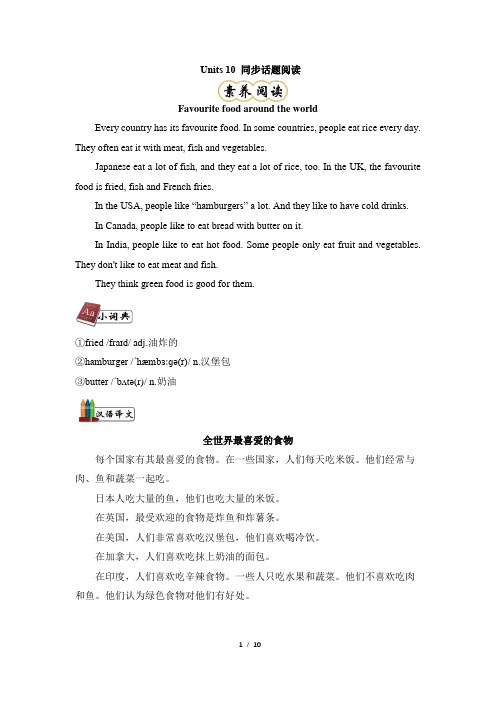
Units 10 同步话题阅读Favourite food around the worldEvery country has its favourite food. In some countries, people eat rice every day. They often eat it with meat, fish and vegetables.Japanese eat a lot of fish, and they eat a lot of rice, too. In the UK, the favourite food is fried, fish and French fries.In the USA, people like “hamburgers” a lot. And they like to have cold drinks.In Canada, people like to eat bread with butter on it.In India, people like to eat hot food. Some people only eat fruit and vegetables. They don't like to eat meat and fish.They think green food is good for them.①fried /fraɪd/ adj.油炸的②hamburger /ˈhæmbɜːɡə(r)/ n.汉堡包③butter /ˈbʌtə(r)/ n.奶油全世界最喜爱的食物每个国家有其最喜爱的食物。
在一些国家,人们每天吃米饭。
他们经常与肉、鱼和蔬菜一起吃。
日本人吃大量的鱼,他们也吃大量的米饭。
在英国,最受欢迎的食物是炸鱼和炸薯条。
在美国,人们非常喜欢吃汉堡包,他们喜欢喝冷饮。
在加拿大,人们喜欢吃抹上奶油的面包。
在印度,人们喜欢吃辛辣食物。
(完整word版)最新深圳七年级下册全套英语课文及翻译

Unit 1 People around usGrammar : learn how to use the definite article theWriting: an article about a person you loveMy grandmaMy grandma was a short woman with grey hair. She was always cheerful. She was a very good cook. Her dishes were probably the best in the world. I will never forget the taste, and the smell as well.Grandma took care of my family. She was really kind and patient. She died two years ago and I miss her very much. ----BenAliceAlice is my best friend. She is a tall girl with glasses. She often tells me jokes to make me laugh, but she never makes fun of others.Alice is a smart girl. She is good at Maths. We often study and play tennis together. I hope we will always remain friends. -----JoyceMr LiMr Li si my Maths teahcer. He is tall and thin. His classes are always full of fun. He uses lots of games in his teaching.Mr Li is strict about our studies, but he always encourages us and gives us support. He often says, “ Never give up and you’ll be successful.” ----Amy我的奶奶我的奶奶是一个有着灰色头发的矮个子女人。
(word完整版)人教版英语七年级下学期1-12单元句子翻译专练及答案
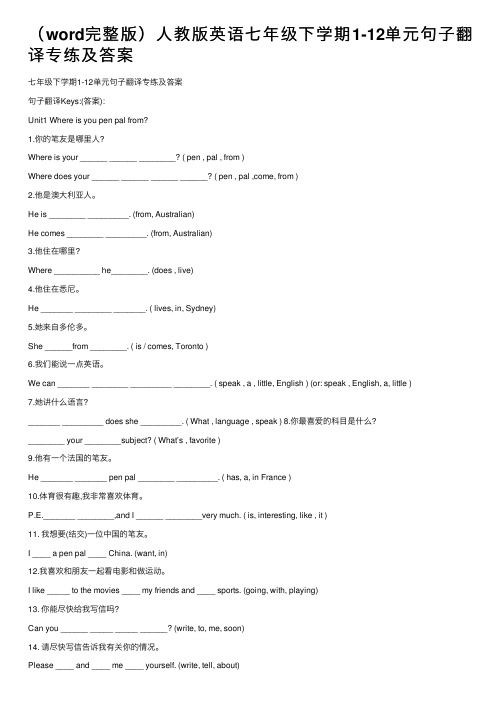
(word完整版)⼈教版英语七年级下学期1-12单元句⼦翻译专练及答案七年级下学期1-12单元句⼦翻译专练及答案句⼦翻译Keys:(答案):Unit1 Where is you pen pal from?1.你的笔友是哪⾥⼈?Where is your ______ ______ ________? ( pen , pal , from )Where does your ______ ______ ______ ______? ( pen , pal ,come, from )2.他是澳⼤利亚⼈。
He is ________ _________. (from, Australian)He comes ________ _________. (from, Australian)3.他住在哪⾥?Where __________ he________. (does , live)4.他住在悉尼。
He _______ ________ _______. ( lives, in, Sydney)5.她来⾃多伦多。
She ______from ________. ( is / comes, Toronto )6.我们能说⼀点英语。
We can _______ ________ _________ ________. ( speak , a , little, English ) (or: speak , English, a, little )7.她讲什么语⾔?_______ _________ does she _________. ( What , language , speak ) 8.你最喜爱的科⽬是什么?________ your ________subject? ( What’s , favorite )9.他有⼀个法国的笔友。
He _______ _______ pen pal ________ _________. ( has, a, in France )10.体育很有趣,我⾮常喜欢体育。
(word完整版)2017新人教版七年级下册英语单词表(翻译中文)

七下Unit 1 Can you play the guitar guitar /ɡɪ'tɑ:(r)/sing /sɪŋ/swim /swɪm/dance /dɑ:ns/, /dæns/draw /drɔ:/chess /tʃes/play chessspeak /spi:k/speak Englishjoin /dʒɔɪn/club /klʌb/be good at…tell /tel/story /'stɔ:ri/write /raɪt/show /ʃəʊ/or /ɔ:(r)/talk/tɔ:k/talk to…kung fu /kʌŋ'fu:/drum /drʌm/play the drums piano /pi'ænəʊ/play the pianoviolin /vaɪə'lɪn/play the violinalso /'ɔ:lsəʊ/ a dv.people /'pi:pl/ n.home /həʊm/be good with…make /meɪk/make friendstoday /tə'deɪ/help (sb) with sthcenter (=centre) /'sentə(r)/ weekend /wi:k'end/, /'wi:kend/ on the weekendteach /ti:tʃ/musician /mju:'zɪʃn/七下Unit 2 What time do you go to schoolup /ʌp/get updress /dres/get dressedbrush /brʌʃ/tooth /tu:θ/ n.(pl. teeth /ti:θ/shower /'ʃaʊə(r)/take a showerusually /'ju:ʒuəli/forty /'fɔ:(r)ti/wow /waʊ/never /'nevə(r)/early /'ɜ:(r)li/fifty /'fɪfti/job /dʒɒb/, /dʒɑ:b/work /wɜ:(r)k/station /'steɪʃn/ n.radio stationo'clock "/ə'klɒk/, night /naɪt/funny /'fʌni/exercise /'eksəsaɪz/on weekendsbest /best/group /ɡru:p/half /hɑ:f/, /hæf/past /pɑ:st/, /pæst/ quarter /'kwɔ:(r)tə(r)/ homework /'həʊmwɜ:(r)k/ do (one's) homeworkrun /rʌn/clean /kli:n/walk /wɔ:k/take a walkquickly/'kwɪkli/either "/'aɪðə(r)/, either…or…lot /lɒt/, /lɑ:tlots ofsometimes /'sʌmtaɪmz/ a dv. taste /teɪst/life /laɪf/七下Unit 3 How do you get to school train /treɪn/bus /bʌs/subway /'sʌbweitake the subwayride /raɪd/bike /baɪk/ride a bikesixty /'sɪksti/ num.seventy /'sevnti/eighty /'eɪti/ninety /'naɪnti/hundred /'hʌndrəd/minute /'mɪnɪt/far /fɑ:(r)/kilometer (=kilometre) /'kɪləmi:tə/, /kɪ'l ɑ:mi:tər/new /nju:/, /nu:/every /'evri/ every dayby /baɪ/by bikedrive /draɪv/car /kɑ:(r)/live/lɪv/stop /stɒp/, /stɑ:p/ think ofcross /krɒs/, /krɔ:s/ river /'rɪvə(r)/ many /'meni/ village /'vɪlɪdʒ/ between /bɪ'twi:n/ between…and…bridge /brɪdʒ/boat /bəʊt/ ropeway /'rəʊp,weɪ/ year /jɪə/, /jɪr/ afraid /ə'freɪd/like/laɪk/villager /'vɪlɪdʒə(r) leave /li:v/dream /dri:m/true /tru:/come ture七下Unit 4 Don’t eat in class rule /ru:l/arrive /ə'raɪv/(be) on timehallway /'hɔ:lweɪ/hall/hɔ:l/dining hall /'daɪnɪŋ/listen /'lɪsn/listen to…fight /faɪt/sorry /'sɒri/, /'sɑ:ri/outside /aʊt'saɪd/wear /weə/, /wer/important /ɪm'pɔ:(r)tnt/bring /brɪŋ/uniform /'ju:nɪfɔ:(r)m/quiet /'kwaɪət/ out /aʊt/go outpractice /'præktɪs/ dish /dɪʃ/ ndo the dishesbefore /bɪ'fɔ:(r)/make (one's) beddirty /'dɜ:(r)ti/ kitchen /'kɪtʃɪn/more /mɔ:(r)/noisy /'nɔɪzi/relax /rɪ'læks/read /ri:d/terrible /'terəbl/feel/fi:l/strict /strɪkt/be strict (with sb) remember /rɪ'membə(r)/ follow "/'fɒləʊ/,/'fɑ:ləʊ/"follow the rulesluck /lʌk/keep /ki:p/hair /heə/, /her/learn /lɜ:(r)n/七下Unit 5 What do you like pandas panda /'pændə/zoo /zu:/tiger /'taɪgə(r)/elephant /'elɪfənt/koala /kəʊ'ɑ:lə/lion /'laɪən/giraffe /dʒə'rɑ:f/, /dʒə'ræf/ n.animal /'ænɪml/cute /kju:t/lazy /'leɪzi/smart /smɑ:(r)t/beautiful /'bju:tɪfl/scary /'skeəri/, /'skeri/kind /kaɪnd/ kind ofAustralia /ɒ'streɪlɪə/ south /saʊθ/ Africa /'æfrɪkə/ South Africapet /pet/leg /leg/cat /kæt/sleep /sli:p/ friendly /'frendli/ shy /ʃaɪ/save /seɪv/ symbol /'sɪmbl/ n flag /flæg/ forget /fə(r)'get/ get lostplace /pleɪs/ water "/'wɔ:tə/,/'wɑ:tər/"danger /'deɪndʒə(r)/ be in (great) danger cut /kʌt/down /daʊn/cut downtree/tri:/kill /kɪl/ivory /'aɪvəri/ n.over /'əʊvə(r)/(be) made of七下Unit 6 I’m watching TV newspaper /'nju:zpeɪpə/, /'nu:zpeɪpər/ read a newspaperuse /ju:z/soup /su:p/make soupwash /wɒʃ/, /wɔ:ʃ/movie /'mu:vi/go to the moviesjust /dʒʌst/eat outhouse /haʊs/drink /drɪŋk/ tea /ti:/drink teatomorrow /tə'mɒrəʊ/, /tə'mɑ:rəʊ/ pool /pu:l/shop /ʃɒp/, /ʃɑ:p/supermarket /'su:pə(r),mɑ:(r)kət/ man /mæn/race /reɪs/host /həʊst/study /'stʌdi/state /steɪt/the United States /ju'naɪtɪd 'steɪts/ American /ə'merɪkən/dragon /'drægən/Dragon Boat Festivalany /'eni/other /'ʌðə(r)/young /jʌŋ/child /tʃaɪld/ n.(pl. children /tʃɪldrən/) miss /mɪs/wish /wɪʃ/delicious /dɪ'lɪʃəs/still /stɪl/living room七下Unit 7 It's raining!windy /'wɪndi/cloudy /'klaʊdi/sunny /'sʌni/snow /snəʊ/weather /'weðə(r)/ cook /kʊk/bad /bæd/park /pɑ:(r)k/ message /'mesɪdʒ/take a messagehim /hɪm/could /kʊd/ back /bæk/call (sb) back (problem /'prɒbləm/, /'prɑ:bləm/ again /ə'ɡen/, /ə'ɡeɪn/dry /draɪ/cold /kəʊld/hot /hɒt/, /hɑ:t/warm /wɔ:(r)m/visit /'vɪzɪt/Canada/'kænədə/summer /'sʌmə(r)/sit /sɪt/juice /dʒu:s/soon /su:n/vacation /veɪ'keɪʃn/ n.假期on (a) vacationhard /hɑ:(r)d/Europe /'jʊərəp/mountain /'maʊntən/country /'kʌntri/skate /skeɪt/snowy /'snəʊi/winter /'wɪntə(r)/Russian /'rʌʃn/snowman /'snəʊmæn/rainy /'reɪni/七下Unit 8 Is there a post office near here?post /pəʊst/office /'ɒfɪs/, /'ɑ:fɪs/post officepolice /pə'li:s/police stationhotel /həʊ'tel/restaurant /'restrɒnt/, /'restərɑ:nt/bank /bæŋk/hospital "/'hɒspɪtl/,/'hɑ:spɪtl/" street /stri:t/pay /peɪ/pay phonenear /nɪə/, /nɪr/across /ə'krɒs/, /ə'krɔ:s/ across fromfront /frʌnt/in front ofbehind /bɪ'haɪnd/town /taʊn/around /ə'raʊnd/north /nɔ:(r)θ/along "/ə'lɒŋ/,/ə'lɔ:ŋ/"go along (the street)turn /tɜ:(r)n/right /raɪt/left /left/turn right / leftcrossing /'krɒsɪŋ/, /'krɔ:sɪŋ/ neighborhood /'neɪbə(r)hʊd/ spend /spend/spend timeclimb /klaɪm/road /rəʊdoften /'ɒfn/, /'ɔ:fn/air /eə/, /er/sunshine /'sʌnʃaɪn/free /fri:/enjoy /ɪn'dʒɔɪ/enjoy readingeasily /'i:zəli/money /'mʌni/ n七下Unit 9 What does he look like? curly /'kɜ:(r)li/straight/streɪt/tall /tɔ:l/medium /'mi:diəm/height /haɪt/(be) of medium heightthin /θɪn/heavy /'hevi/build /bɪld/ (be) of medium build tonight /tə'naɪt/little /'lɪtl/a littlecinema /'sɪnəmə/ glasses /'glɑ:sɪz/, /'glæsɪz/ later /'leɪtə(r)/ handsome /'hænsəm/ actor /'æktəactress /'æktrəs/ person /'pɜ:(r)sn/nose /nəʊz/blonde /blɒnd/, /blɑ:nd/ mouth /maʊθ/round /raʊnd/face /feɪs/eye /aɪ/singer /'sɪŋə(r)/artist /'ɑ:(r)tɪst/crime /kraɪm/ criminal /'krɪmɪnl/put /pʊt/each /i:tʃ/way /weɪ/describe /dɪ'skraɪb/differently /'dɪfərəntli/another/ə'nʌðə(r)/end /end/in the endreal/rɪəl/jeans /dʒi:nz/七下Unit 10 I'd like some noodles. noodle /'nu:dl/mutton /'mʌtn/beef /bi:f/cabbage /'kæbɪdʒ/potato /pə'teɪtəʊ/special /'speʃəl/would /wʊd/ would likeyet /jet/large /lɑ:(r)dʒ/order /'ɔ:(r)də(r)/take one's ordersize /saɪz/bowl /bəʊl/one (large) bowl of…tofu /'təʊfu:/meat /mi:t/dumpling /'dʌmplɪŋ/ porridge /'pɒrɪdʒ/, /'pɔ:rɪdʒ/ onion /'ʌnjən/fish /fɪʃ/pancake /'pænk/world /wɜ:(r)ld/around the worldanswer /'ɑ:nsə/, /'ænsər/ different /'dɪfərənt/cake /keɪk/candle /'kændl/age /eɪdʒ/make a wishblow /bləʊ/blow outif /ɪf/will /wɪl/the UK /,ju:'keɪ/candy /'kændi/lucky /'lʌki/popular/'pɑ:pjʊlər/"get popularcut upidea /aɪ'dɪə/, /aɪ'dɪr/bring good luck to…七下Unit 11 H ow was your school trip? milk /mɪlk/cow /kaʊ/milk a cowhorse /hɔ:(r)s/ride a horse feed /fi:d/ v. (fed /fed/ ) feed chickensfarmer /'fɑ:(r)mə(r)/quite /kwaɪt/quite a lot (of…)anything /'enɪθɪŋ/grow /grəʊ/ v.(grew /gru:/) farm /fɑ:(r)m/pick /pɪk/excellent /'eksələnt/ countryside /'kʌntrisaɪd/in the countryside yesterday /'jestə(r)di/ flower /'flaʊə(r)/worry /'wʌri/, /'wɜ:ri/ luckily /'lʌkɪli/sun /sʌn/museum /mju:'ziəm/fire /'faɪə(r)/fire stationpainting /'peɪntɪŋ/ exciting /ɪk'saɪtɪŋ/lovely /'lʌvli/expensive /ɪk'spensɪv/cheap /tʃi:p/slow /sləʊ/fast /fɑ:st/, /fæst/robot /'rəʊbɒt/, /'rəʊbɑ:t/guide /gaɪd/gift /gɪft/all in alleverything /'evriθɪŋ/interested /'ɪntrəstɪd/be interested indark /dɑ:(r)k/hear /hɪə/, /hɪr/ v.(heard /hɜ:(r).七下Unit 12 What did you do last weekend?camp /kæmp/lake /leɪk/ beach /bi:tʃ/badminton /'bædmɪntən/sheep /ʃi:p/as /æz, əz/natural /'nætʃərəl/butterfly /'bʌtə(r)flaɪ/visitor /'vɪzɪtə(r)/tired /taɪə(r)d/stay /steɪ/stay up lateaway /ə'weɪ/run awaymouse /maʊs/ n.(pl. mice /maɪs/) baby /'beɪbi/shout /ʃaʊt/shout at…woof /wʊf/language /'læŋgwɪdʒ/fly /flaɪ/ v. (flew /flu:/)kite/kaɪt/fiy a kitehigh /haɪ/high schoolago /ə'gəʊ/India /'ɪndiə/tent/tent/put upmoon /mu:n/surprise /sə(r)'praɪz/get a surprisesnake /sneɪk/scared /skeəd/, /skerd/move /mu:v/shout to…start /stɑ:(r)t/jump /dʒʌmp/up and downwake /weɪk/ v.(woke /wəʊk/ wake…upinto /'ɪntu:/ prepforest /'fɒrɪst/, /'fɔ:rɪst/ear /ɪə/, /ɪr/。
(完整word版)外研版七年级下册英语课文翻译(2)

外研版精装修正版七年级下册全部课文翻译1初一下册Module 1 Lost and found2M1U1 Whose bag is this? 这是谁的书包?李老师:欢迎大家回到学校!首先,来看看失物招领箱!里面有好多东西。
这是谁的书包?玲玲:哦,对不起!是我的。
我的蜡笔也在里面吗?李老师:这些蜡笔是你的吗?玲玲:是的,是我的,还有这块橡皮也是。
谢谢你。
李老师:这些磁带是谁的?大明:是我的。
李老师:这里有一个紫色的钱包。
托尼:它是我的。
看!这里有我的名字“托尼”!谢谢。
李老师:不客气!看这块不错的表,也是你的吗,大明?大明:不,不是。
我想它是贝蒂的。
玲玲:是的,是她的。
李老师:同学们,从现在开始,请大家注意保管好自己的物品。
大明:这里有一些漂亮的手套。
他们是谁的?李老师:让我看看……哦,他们是我的!谢谢你!2 M1U2 他们是你的吗?纽约市失物招领处欢迎来到纽约市失物招领处。
人们在旅行时或者是匆忙之间经常会丢弃东西。
他们把东西落在飞机上、火车上、汽车上或出租车上。
那就是为什么机场和车站会设有失物招领处。
纽约市失物招领处非常大。
每天会有上百人来到这里。
他们来找他们的电话机、照相机、手表、计算机和许多其他东西。
我们通常大约有两千部手机和一千部照相机。
此时此刻,在纽约市失物招领处还有一些不同寻常的东西。
那里大约有一百辆自行车和一艘大船。
还有许多动物。
本周有三只狗,两只鸭子和一头猪!它们是谁的?它们是你的吗?我们不知道。
你正在寻找十五公斤重的香肠吗?它们也在这里!3 Module 2 What can you do? 你会做什么? M2U1 I can play the piano. 我会弹钢琴。
大明:看,本学期的新社团公布在布告栏里了。
我想参加音乐社团,因为我会弹钢琴。
你呢,贝蒂?贝蒂:我喜欢烹饪,所以我能参加吃喝社团。
你会做饭吗,大明?大明:不,我不太会。
嗯,我会做鸡蛋,不过仅此而已。
玲玲呢?她能参加哪个社团?贝蒂:我想她会参加舞蹈社团,因为她跳舞跳得很好。
(完整word版)新人教版七年级下册unit1canyouplaytheguitar教案知识点语法点整理

Unit 1 Can you play the guitar?Section A1A1.join v. 参加,加入(团体、社团、组织)joins 第三人称✓join+ 团体/组织1)join the club 参加社团、俱乐部2)join the army 参军eg. My brother want s to join the army. 我哥哥想参军。
3)join the Young Pioneers 加入少先队(专有名词大写)4)join the NBA 加入(美国)全国篮球协会✓join的用法1)join + sb(动词的人后都用宾格)Do you want to join us? 你想加入我们吗?2)join + sb(宾格)+for thingI want you to join us for the concert.我想让你加入我们一起准备音乐会。
3)join + sb(宾格)+to d o somethingI want to join them to go to the Great Wall.4)join + sb(宾格)+ in d oing somethingCan I join you in playing the game? 我能加入你们一起玩游戏吗?宾格:me/ you/ him/ her/ it/ us/ you/ them/5)join in +( sth)Peter d oesn’t want to join in the conversation. Peter不想加入谈话。
2.club n. 俱乐部、社团(复数clubs)the art club 美术俱乐部the swimming club 游泳俱乐部the English club 英语俱乐部the basketball club 篮球俱乐部the music club 音乐俱乐部3.can 是情态动词,表示“能够,会,能”1)can后加动词原型I can draw;She can sing and dance;They can play the guitar.2)否定式can’t =cannot3) 疑问句式:can+主语+动词原型(你会……吗?)Can he play the chess?Yes, he can/No, he can’t.4)第二个意思:表示请求,征求意见Can I watch TV, Dad? Sure 我能看电视吗?爸爸。
(完整word版)广州深圳牛津英语七年级下册_unit3_Ablindmanandhis“eyes”inafire_课堂讲义
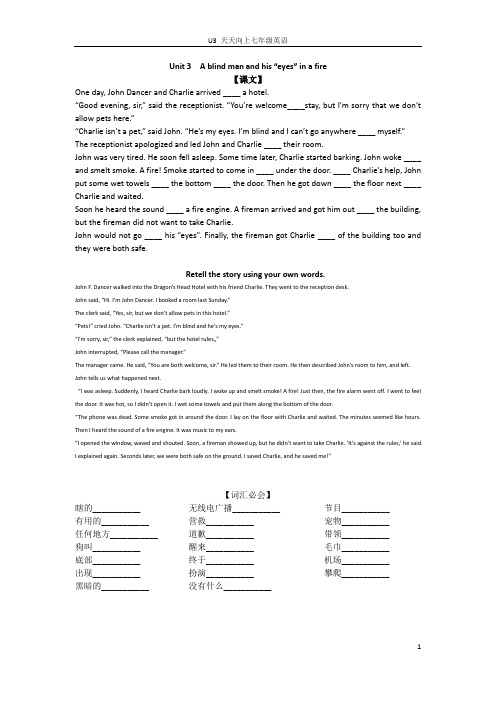
Unit 3 A blind man and his “eyes” in a fire【课文】One day, John Dancer and Charlie arrived ____ a hotel.“Good evening,sir,” said the receptionist. “You’re welcome____stay, but I’m sorry that we don’t allow pets here.”“Charlie isn’t a pet,” said John.“He’s my eyes.I’m blind and I can’t go anywhere ____ myself.” The receptionist apologized and led John and Charlie ____ their room.John was very tired. He soon fell asleep. Some time later, Charlie started barking. John woke ____ and smelt smoke. A fire! Smoke started to come in ____ under the door. ____ Charlie’s help, John put some wet towels ____ the bottom ____ the door. Then he got down ____ the floor next ____ Charlie and waited.Soon he heard the sound ____ a fire engine. A fireman arrived and got him out ____ the building, but the fireman did not want to take Charlie.John would not go ____ his “eyes”. Finally, the fireman got Charlie ____ of the building too and they were both safe.Retell the story using your own words.John F. Dancer walked into the Dragon’s Head Hotel with his friend Charlie. They went to the reception desk.John said, “Hi. I’m John Dancer. I booked a room last Sunday.”The clerk said, “Yes, sir, but we don’t allow pets in this hotel.”“Pets!” cried John. “Charlie isn’t a pet. I’m blind and he’s my eyes.”“I’m sorry, sir,” the clerk explained, “but the hotel rules…”John interrupted, “Please call the manager.”The manager came. He said, “You are both welcome, sir.” He led them to their room. He then described John’s room to him, and left. John tells us what happened next.“I was asleep. Suddenly, I heard Charlie bark loudly. I woke up and smelt smoke! A fire! Just then, the fire alarm went off. I went to feel the door. It was hot, so I didn’t open it. I wet some towels and put them along the bottom of the door.“The p hone was dead. Some smoke got in around the door. I lay on the floor with Charlie and waited. The minutes seemed like hours. Then I heard the sound of a fire engine. It was music to my ears.“I opened the window, waved and shouted. Soon, a fireman showed up, but he didn’t want to take Charlie. ‘It’s against the rules,’ he said.I explained again. Seconds later, we were both safe on the ground. I saved Charlie, and he saved me!”【词汇必会】瞎的___________ 无线电广播___________ 节目___________有用的___________ 营救___________ 宠物___________任何地方___________ 道歉___________ 带领___________狗叫___________ 醒来___________ 毛巾___________底部___________ 终于___________ 机场___________出现___________ 扮演___________ 攀爬___________黑暗的___________ 没有什么___________现学现卖1. On the Open Day of our school, our parents watched theschool hall.2. Exercise is to keep us healthy. So why not go outside and exercise for a while?3. We shouldn’t make jokes about the . Instead, we should help them.4. Nowadays, not many young people enjoy listening to the . They prefer to use MSN or MicroBlog.5. The river is so clear that you can see the of it.6. , they got to the top of the mountain successfully.7. After you wash your face, don’t forget to wash your as well.8. The team arrived soon after the fire started. They saved a lot of people from the burning buildings.9.Simon cannot find his pen in the classroom. Maybe someone took it by mistake.10. You should to Mr Li for your mistake. And please don’t do that again.11. In the USA, if a dog three times, the owner will be punished.12. No dogs are in this restaurant.13.Joe: What does this word , Mum?Mum: Use your dictionary and look it up.14. The told us that we could stay at Room 1505. It was on a non-smoking floor.15. Do you have a at home? I mean a dog or a cat.16. Miss Wang will the students to their classroom.词汇拓展1.blind 瞎的,失明的例:Robert is blind in the left eye.2.radio 无线电广播,收音机3.programme 节目翻译:你昨晚看了那个关于巴黎的电视节目吗?4.helpful 有用的,有帮助的例:The book about diet is very helpful.5.mean (过去式meant) 表示…意思例:what does this sign mean?6.allow 允许进入翻译:这里不允许宠物进入。
(完整word)人教版七年级下册英语1-12单元重点句子翻译
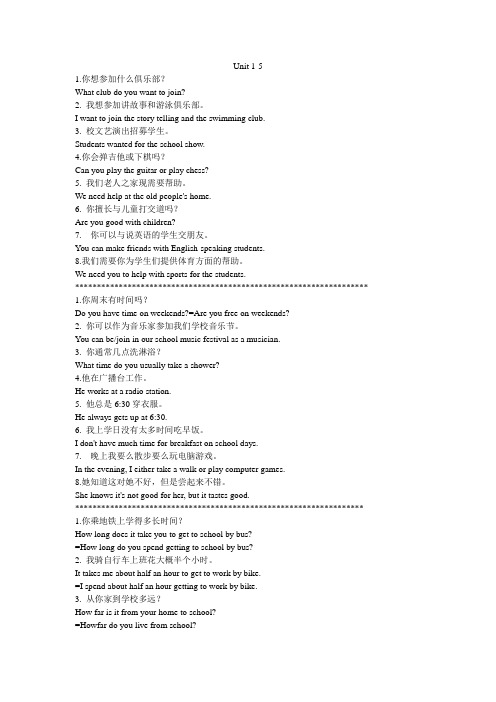
Unit 1-51.你想参加什么俱乐部?What club do you want to join?2. 我想参加讲故事和游泳俱乐部。
I want to join the story telling and the swimming club.3. 校文艺演出招募学生。
Students wanted for the school show.4.你会弹吉他或下棋吗?Can you play the guitar or play chess?5. 我们老人之家现需要帮助。
We need help at the old people's home.6. 你擅长与儿童打交道吗?Are you good with children?7. 你可以与说英语的学生交朋友。
You can make friends with English-speaking students.8.我们需要你为学生们提供体育方面的帮助。
We need you to help with sports for the students.******************************************************************* 1.你周末有时间吗?Do you have time on weekends?=Are you free on weekends?2. 你可以作为音乐家参加我们学校音乐节。
You can be/join in our school music festival as a musician.3. 你通常几点洗淋浴?What time do you usually take a shower?4.他在广播台工作。
He works at a radio station.5. 他总是6:30穿衣服。
He always gets up at 6:30.6. 我上学日没有太多时间吃早饭。
七下英语对话材料
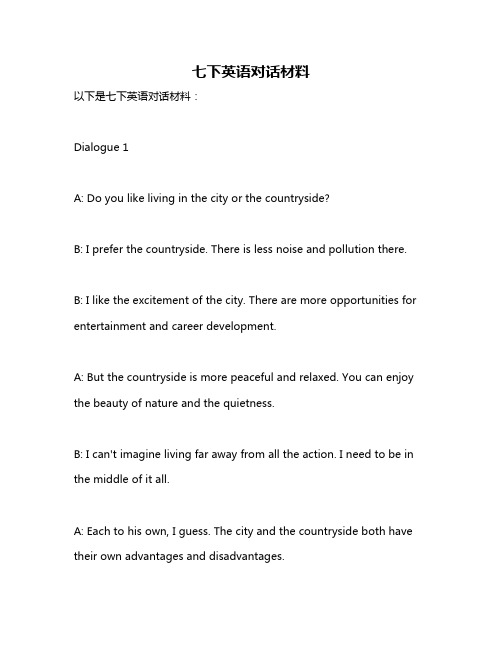
七下英语对话材料以下是七下英语对话材料:Dialogue 1A: Do you like living in the city or the countryside?B: I prefer the countryside. There is less noise and pollution there.B: I like the excitement of the city. There are more opportunities for entertainment and career development.A: But the countryside is more peaceful and relaxed. You can enjoy the beauty of nature and the quietness.B: I can't imagine living far away from all the action. I need to be in the middle of it all.A: Each to his own, I guess. The city and the countryside both have their own advantages and disadvantages.Dialogue 2A: Excuse me, could you tell me the way to the nearest post office?B: Sure, it's just around the corner on Main Street. You can walk there in about five minutes.A: Thank you. What are the opening hours of the post office?B: They are from 9 am to 5 pm, Monday to Friday.A: Do they deliver mail on Saturday and Sunday?B: No, they don't. The post office is closed on weekends.A: OK, I will go there during their opening hours. Thank you for your help.B: You're welcome.。
(word完整版)最新人教版七年级下册英语单词表

Unit 1 Can you play the guitarguitar/ɡɪ'tɑ:(r)/ n.吉他sing/sɪŋ/ v.唱;唱歌swim/swɪm/ v.&n.游泳dance /dɑ:ns/, /dæns/ v.跳舞;n.舞蹈draw/drɔ:/ v.画chess /tʃes/ n.国际象棋play chess下国际象棋speak/spi:k/ v.说(某种语言);说话speak English说英语join/dʒɔɪn/ v.参加;加入join in参加(活动);加入进来club/klʌb/ n.俱乐部;社团be good at…擅长于…tell/tel/ v.讲述;告诉tell sb. straight 直截了当地告诉某人story/'stɔ:ri/ n.故事;小说write/raɪt/ v.写作;写字show/ʃəʊ/ n.演出;节目; v.给…看;展示or/ɔ:(r)/ conj.或者;也不(用于否定句)talk/tɔ:k/ v.&n.说话;交谈talk to…跟……说talk about 谈论kung fu /kʌŋ'fu:/ n.(中国)功夫drum/drʌm/ n.鼓play the drums 敲鼓piano/pi'ænəʊ/ n.钢琴play the piano 弹钢琴violin/vaɪə'lɪn/ n.小提琴play the violin拉小提琴also/'ɔ:lsəʊ/ adv.也;而且people/'pi:pl/ n.人;人们home/həʊm/ n.家;活动本部; adv.到家;在家be good with…善于应付……的;对……有办法make/meɪk/ v.使成为;制造make friends 结交朋友today/tə'deɪ/ adv.在今天help (sb) with sth在某方面帮助(某人) center (=centre)/'sentə(r)/ n.中心;中央weekend/wi:k'end/, /'wi:kend/ n.周末on the weekend(在)周末teach/ti:tʃ/ v.教;讲授musician /mju:'zɪʃn/ n.音乐家Unit 2 What time do you go to schoolup/ʌp/ adv.向上get up起床;站起dress/dres/ v.&n.穿衣服;连衣裙get dressed 穿上衣服brush/brʌʃ/ v.&n.刷;刷净;刷子tooth /tu:θ/ n.(pl. teeth /ti:θ/)牙齿shower /'ʃaʊə(r)/ n.&v.淋浴;淋浴器(间)take a shower 洗淋浴usually/'ju:ʒuəli/ adv.通常地;一般地forty /'fɔ:(r)ti/ num.四十wow/waʊ/ int.(表示惊奇或敬佩)哇;呀never /'nevə(r)/ adv.从不;绝不early/'ɜ:(r)li/ adv.&adj.早(的)fifty/'fɪfti/ num.五十job/dʒɒb/, /dʒɑ:b/ n.工作;职业on the job 在职part-time job 兼职工作work/wɜ:(r)k/ v.&n.工作station/'steɪʃn/ n.电(视)台;车站radio station 广播电台o'clock"/ə'klɒk/, /ə'klɑ:k/" adv.(表示整点)…点钟night/naɪt/ n.晚上;夜晚funny/'fʌni/ adj.奇怪的;滑稽好笑的exercise/'eksəsaɪz/ v.&n.锻炼;练习on weekends (在)周末best/best/ adj.&adv.最好的;最好地;最group /ɡru:p/ n.组;群half/hɑ:f/, /hæf/ n.&pron.一半;半数haves half的复数past /pɑ:st/, /pæst/ prep.晚于;过(时间); adj.过去的quarter /'kwɔ:(r)tə(r)/ n.一刻钟;四分之一homework/'həʊmwɜ:(r)k/ n.家庭作业do (one's) homework做作业run /rʌn/ v.跑;奔clean/kli:n/ v.打扫;弄干净; adj.干净的walk/wɔ:k/ n.&v.行走;步行take a walk散步;走一走quickly/'kwɪkli/ adv.很快地either"/'aɪðə(r)/, 'i:ðə(r)/"adv.或者;也(用在否定词组后) either…or…要么…要么…;或者…或者…lot/lɒt/, /lɑ:t/ pron.大量;许多lots of大量;许多sometimes/'sʌmtaɪmz/ adv.有时taste/teɪst/v.有…的味道;品尝; n.味道;滋味life/laɪf/ n. (pl. lives /laɪvz/)生活;生命Unit 3 How do you get to school train/treɪn/ n.火车bus /bʌs/ n.公共汽车subway /'sʌbweɪ/ n.地铁take the subway乘地铁ride/raɪd/ v.&n.骑;旅程give sb. a ride 让某人搭便车bike/baɪk/ n.自行车ride a bike骑自行车sixty/'sɪksti/ num.六十seventy/'sevnti/ num.七十eighty/'eɪti/ num.八十ninety/'naɪnti/ num.九十hundred/'hʌndrəd/ num.一百minute/'mɪnɪt/ n.分钟in a minute 马上far/fɑ:(r)/ adv.&adj.远;远的kilometer (=kilometre)/'kɪləmi:tə/, /kɪ'lɑ:mi:tər/ n.千米;公里new/nju:/, /nu:/ adj.新的;刚出现的every/'evri/ adj.每一;每个every day每天by /baɪ/prep.(表示方式)乘(交通工具)by bike骑自行车drive/draɪv/ v.开车car/kɑ:(r)/ n.小汽车;轿车live /lɪv/ v.居住;生活stop/stɒp/, /stɑ:p/ n.车站;停止think of认为cross/krɒs/, /krɔ:s/ v.横过;越过river/'rɪvə(r)/ n.河;江many/'meni/ adj.&pron.许多village/'vɪlɪdʒ/ n.村庄;村镇between/bɪ'twi:n/ prep.介于……之间between…and…在……和……之间bridge/brɪdʒ/ n.桥boat /bəʊt/ n.小船ropeway/'rəʊp,weɪ/ n.索道year/jɪə/, /jɪr/ n.年;岁afraid/ə'freɪd/ adj.害怕;畏惧like /laɪk/ prep.像;怎么样villager /'vɪlɪdʒə(r)/ n.村民leave/li:v/ v.离开leave for 动身到dream/dri:m/ n.梦想;睡梦;v.做梦true/tru:/ adj.真的;符合事实的come ture 实现;成为现实Unit 4 Don’t eat in classrule/ru:l/ n.规则;规章arrive/ə'raɪv/ v.到达(be) on time 准时hallway/'hɔ:lweɪ/ n.走廊;过道hall /hɔ:l/ n.大厅;礼堂dining hall/'daɪnɪŋ/ 餐厅listen/'lɪsn/ v.听;倾听listener n.听众listen to…听……fight/faɪt/ v.&n.打架;战斗sorry/'sɒri/, /'sɑ:ri/ adj.抱歉的;难过的;惋惜的outside /aʊt'saɪd/ adv.在外面; adj.外面的wear /weə/, /wer/ v.穿;戴importan t /ɪm'pɔ:(r)tnt/ adj.重要的bring/brɪŋ/ v.带来;取来uniform/'ju:nɪfɔ:(r)m/ n.校服;制服quiet/'kwaɪət/ adj.安静的out/aʊt/ adv.外出go out外出(娱乐)practice/'præktɪs/ v.&n.练习dish/dɪʃ/ n.碟;盘do the dishes 清洗餐具before/bɪ'fɔ:(r)/ prep.&conj.在……以前;adv.以前make (one's) bed 铺床dirty/'dɜ:(r)ti/ adj.脏的kitchen /'kɪtʃɪn/ n.厨房more/mɔ:(r)/ adj.&pron.更多(的)noisy/'nɔɪzi/ adj.吵闹的relax/rɪ'læks/ v.放松;休息read/ri:d/ v.读;阅读terrible /'terəbl/ adj.非常讨厌的;可怕的feel/fi:l/ v.感受;觉得strict/strɪkt/ adj.严格的;严厉的be strict in sth 对某事要求严格be strict with sb (对某人)要求严格remember/rɪ'membə(r)/ v.记住;记起follow"/'fɒləʊ/, /'fɑ:ləʊ/" v.遵循;跟随follow the rules遵守规则luck/lʌk/ n.幸运;运气keep/ki:p/ v.保持;保留hair/heə/, /her/ n.头发;毛发learn/lɜ:(r)n/ v.学习;学会Unit 5What do you like pandas panda/'pændə/ n.熊猫zoo/zu:/ n.动物园tiger/'taɪgə(r)/ n.老虎elephant/'elɪfənt/ n.大象koala/kəʊ'ɑ:lə/ n.树袋熊;考拉lion /'laɪən/ n.狮子giraffe/dʒə'rɑ:f/, /dʒə'ræf/ n.长颈鹿animal/'ænɪml/ n.动物cute/kju:t/ adj.可爱的;机灵的lazy/'leɪzi/ adj.懒散的;懒惰的smart/smɑ:(r)t/ adj.聪明的beautiful /'bju:tɪfl/ adj.美丽的;美好的scary/'skeəri/, /'skeri/ adj.吓人的;恐怖的kind /kaɪnd/ n.种类kind of稍微;有点儿Australia/ɒ'streɪlɪə/ n.澳大利亚south/saʊθ/ adj.南方的; n.南;南方Africa /'æfrɪkə/ n.非洲South Africa 南非pet/pet/ n.宠物leg/leg/ n.腿cat /kæt/ n.猫sleep/sli:p/ v.&n.睡觉friendly/'frendli/ adj.友好的shy/ʃaɪ/ adj.羞怯的;腼腆的save/seɪv/ v.救;救助symbol/'sɪmbl/ n.象征flag /flæg/ n.旗;旗帜forget/fə(r)'get/ v.忘记;遗忘forget doing sth 忘记做过某事get lost迷路place/pleɪs/ n.地点;位置water"/'wɔ:tə/, /'wɑ:tər/" n.水tap water 自来水danger/'deɪndʒə(r)/ n.危险be in (great) danger 处于(极大)危险之中cut/kʌt/ v.砍;切down/daʊn/ adv.(坐、躺、倒)下; prep.向下;沿着cut down 砍倒tree /tri:/ n.树kill/kɪl/ v.杀死;弄死killer n.杀手ivory /'aɪvəri/ n.象牙over /'əʊvə(r)/ prep.超过,多于;在……上方(be) made of由……制成的Unit 6 I’m watching TVnewspaper /'nju:zpeɪpə/, /'nu:zpeɪpər/ n.报纸read a newspaper看报纸use /ju:z/ v.使用;运用soup/su:p/ n.汤make soup做汤wash/wɒʃ/, /wɔ:ʃ/ v.洗movie/'mu:vi/ n.电影go to the movies 看电影just/dʒʌst/ adv.只是;恰好eat out出去吃饭house/haʊs/ n.房子drink/drɪŋk/ v..喝; n饮料tea /ti:/ n.茶;茶叶drink tea喝茶tomorrow/tə'mɒrəʊ/, /tə'mɑ:rəʊ/adv.在明天; n.明天;未来pool/pu:l/ n.游泳池;水池shop/ʃɒp/, /ʃɑ:p/ v.购物; n.商店supermarket/'su:pə(r),mɑ:(r)kət/ n.超市man/mæn/ n.男人;人race/reɪs/ n.竞赛host/həʊst/ n.主人;东道主study/'stʌdi/ v.&n.学习;研究state/steɪt/ n.州the United States/ju'naɪtɪd 'steɪts/ 美国American /ə'merɪkən/ adj.美国的;美洲的;n.美国人;美洲人dragon/'drægən/ n.龙Dragon Boat Festival端午节any /'eni/ a dj.任何的;任一的; pron.任何;任一other /'ʌðə(r)/ adj.另外的;其他的;pron.另外的人(或物)young/jʌŋ/ adj.幼小的;年轻的child /tʃaɪld/ n.(pl. children /tʃɪldrən/)儿童miss /mɪs/ v.怀念;怀念wish /wɪʃ/ v.希望delicious/dɪ'lɪʃəs/adj.可口的;美味的still /stɪl/ adv.还;仍然living room /'lɪvɪŋ/ 客厅Unit 7 It'sraining!rain/reɪn/ v.下雨; n.雨水windy/'wɪndi/ adj.多风的cloudy/'klaʊdi/ adj.多云的sunny/'sʌni/ adj.晴朗的snow/snəʊ/ v.下雪; n.雪weather/'weðə(r)/ n.天气cook/kʊk/ v.做饭bad /bæd/ adj.坏的;糟的park/pɑ:(r)k/ n.公园message /'mesɪdʒ/ n.信息;消息take a message 捎个口信;传话him/hɪm/ pron.他(he的宾格)could/kʊd/ modal v.能;可以back/bæk/ adv.回来;回原处back and forth 来回地call (sb) back(给某人)回电话problem /'prɒbləm/, /'prɑ:bləm/ n.困难;难题again/ə'ɡen/, /ə'ɡeɪn/ adv.再一次;又一次dry /draɪ/ adj.干燥的cold/kəʊld/ adj.寒冷的;冷的hot /hɒt/, /hɑ:t/ adj.热的warm/wɔ:(r)m/ adj.温暖的visit/'vɪzɪt/ v.拜访;参观Canada /'kænədə/ n.加拿大summer/'sʌmə(r)/ n.夏天;夏季sit/sɪt/ v.坐sit around 闲坐juice/dʒu:s/ n.果汁;饮料soon/su:n/ adv.不久;很快as soon as 一……就……vacation/veɪ'keɪʃn/ n.假期on (a) vacation 度假hard/hɑ:(r)d/ adv.努力地; adj.困难的Europe/'jʊərəp/ n.欧洲mountain/'maʊntən/ n.高山country /'kʌntri/ n.国;国家skate/skeɪt/ v.滑冰snowy/'snəʊi/ adj.下雪的winter/'wɪntə(r)/ n.冬天;冬季Russian/'rʌʃn/ adj.俄罗斯的; n.俄罗斯人;俄语snowman/'snəʊmæn/ n.雪人rainy/'reɪni/ adj.阴雨的;多雨的Unit 8 Is there a post office near here?post/pəʊst/ n.邮政office/'ɒfɪs/, /'ɑ:fɪs/ n.办公室post office邮局police/pə'li:s/ n.警察police station 警察局hotel/həʊ'tel/ n.旅馆;酒店restauran t /'restrɒnt/, /'restərɑ:nt/ n.餐馆bank/bæŋk/ n.银行hospital"/'hɒspɪtl/,/'hɑ:spɪtl/" n.医院street/stri:t/ n.大街pay /peɪ/v.&n.付费pay back 偿还pay phone付费电话near/nɪə/, /nɪr/ prep.在……附近across/ə'krɒs/, /ə'krɔ:s/ adv.&prep.过;穿过across from 在……对面front/frʌnt/ n.前面in front of 在……前面behind/bɪ'haɪnd/ prep.在……后面town/taʊn/ n.镇;市镇around/ə'raʊnd/ adv.&prep.到处;大约north/nɔ:(r)θ/ n.北;北方; adj.北方的along"/ə'lɒŋ/, /ə'lɔ:ŋ/" prep.沿着go along (the street)沿着(这条街)走turn/tɜ:(r)n/ v.转向;翻right/raɪt/ adv.&n.向右边;右边left /left/ adv.&n.向左边;左边turn right / left 向右/左转crossing/'krɒsɪŋ/, /'krɔ:sɪŋ/ n.十字路口neighborhood/'neɪbə(r)hʊd/ n.街区;街坊spend/spend/ v.花(时间、钱等) spend time花时间climb/klaɪm/ v.爬road/rəʊd/ n.路often/'ɒfn/, /'ɔ:fn/ adv.时常;常常air/eə/, /er/ n.空气sunshine/'sʌnʃaɪn/ n.阳光in the sunshine 在阳光下free/fri:/ adj.免费的enjoy/ɪn'dʒɔɪ/ v.享受;喜爱enjoy reading 喜欢阅读easily/'i:zəli/ adv.容易地money/'mʌni/ n.钱Unit 9 What does he look like?curly /'kɜ:(r)li/ adj.卷曲的straight/streɪt/ adj.直的tall/tɔ:l/ adj.高的medium/'mi:diəm/ adj.中等的height/haɪt/ n.身高;高度(be) of medium height 中等身高thin/θɪn/ adj.瘦的heavy/'hevi/ adj.重的build/bɪld/ n.身材(be) of medium build中等身材tonight /tə'naɪt/ adv.&n.(在)今晚;(在)今夜little /'lɪtl/ adj.小的a little 一点;少量cinema/'sɪnəmə/ n.电影院glasses /'glɑ:sɪz/, /'glæsɪz/ n.(pl.)眼睛later/'leɪtə(r)/ adv.以后handsome/'hænsəm/ adj.英俊的actor /'æktə(r)/ n.演员actress /'æktrəs/ n.女演员person/'pɜ:(r)sn/ n.人nose/nəʊz/ n.鼻子blonde/blɒnd/, /blɑ:nd/ adj.金黄色的mouth/maʊθ/ n.嘴round/raʊnd/ adj.圆形的face/feɪs/ n.脸eye /aɪ/ n.眼睛singer/'sɪŋə(r)/ n.歌手artist/'ɑ:(r)tɪst/ n.艺术家crime/kraɪm/ n.犯罪活动criminal/'krɪmɪnl/ n.罪犯put/pʊt/ v.放each/i:tʃ/ adj.&pron.每个;各自way/weɪ/ n.方式;路线describe/dɪ'skraɪb/ v.描述differently/'dɪfərəntli/ adv.不同地another/ə'nʌðə(r)/ adj.&pron.另一;又一end /end/n.结尾;尽头in the end最后real/rɪəl/ adj.真正的;真实的jeans/dʒi:nz/ n.牛仔裤Unit 10 I'd like some noodles.noodle/'nu:dl/ n.面条mutton /'mʌtn/ n.羊肉beef/bi:f/ n.牛肉cabbage/'kæbɪdʒ/ n.卷心菜;洋白菜potato/pə'teɪtəʊ/ n.土豆;马铃薯special/'speʃəl/ n.特色菜;特价品;adj.特别的;特殊的would/wʊd/ modal v.(表示意愿)愿意would like(表示意愿)愿意;喜欢yet/jet/ adv.(常用于否定句或疑问句)还;仍然large/lɑ:(r)dʒ/ adj.大号的;大的order/'ɔ:(r)də(r)/ n.&v.点菜;命令take one's order点菜size/saɪz/ n.大小;尺码bowl/bəʊl/ n.碗one (large) bowl of…一(大)碗...tofu/'təʊfu:/ n.豆腐meat /mi:t/ n.(可食用的)肉dumpling/'dʌmplɪŋ/ n.饺子porridge/'pɒrɪdʒ/, /'pɔ:rɪdʒ/ n.粥;面糊onion/'ʌnjən/ n.洋葱onion soup 洋葱汤fish /fɪʃ/ n.鱼;鱼肉pancake/'pænkeɪk/ n.烙饼;薄饼world/wɜ:(r)ld/ n.世界around the world世界各地answer /'ɑ:nsə/, /'ænsər/ n.答案; v.回答different/'dɪfərənt/ adj.不同的cake/keɪk/ n.蛋糕candle/'kændl/ n.蜡烛age /eɪdʒ/ n.年龄make a wish许愿blow/bləʊ/ v.吹blow out 吹灭if /ɪf/ conj.如果will /wɪl/ v.将要;会the UK/,ju:'keɪ/ n.英国candy/'kændi/ n.糖果lucky/'lʌki/ adj.幸运的popular "/'pɒpjʊlə/, /'pɑ:pjʊlər/"adj.受欢迎的;普遍的get popular 受欢迎;流行cut up切碎idea/aɪ'dɪə/, /aɪ'dɪr/ n.想法;主意bring good luck to…给……带来好运Unit 11 How was your school trip?milk/mɪlk/ v.挤奶cow /kaʊ/n.奶牛milk a cow给奶牛挤奶horse/hɔ:(r)s/ n.马ride a horse骑马feed/fi:d/ v. (fed /fed/ )喂养;饲养feed chickens 喂鸡farmer/'fɑ:(r)mə(r)/ n.农民;农场主quite/kwaɪt/ adv.相当;完全quite a lot (of…)许多anything/'enɪθɪŋ/pron.(常用于否定或疑问句)任何东西;任何事物grow/grəʊ/ v.(grew /gru:/)种植;生长;发育farm /fɑ:(r)m/ n.农场; v.务农;种田pick/pɪk/ v.采;摘excellent/'eksələnt/ adj.极好的;优秀的countryside /'kʌntrisaɪd/ n.乡村;农村in the countryside在乡下;在农村yesterday/'jestə(r)di/ adv.昨天flower/'flaʊə(r)/ n.花worry/'wʌri/, /'wɜ:ri/ v.&n.担心;担忧luckily/'lʌkɪli/ adv.幸运地;好运地sun /sʌn/ n.太阳museum/mju:'ziəm/ n.博物馆fire /'faɪə(r)/ n.火;火灾fire station消防站painting/'peɪntɪŋ/ n.油画;绘画exciting/ɪk'saɪtɪŋ/adj.使人兴奋的;令人激动的lovely/'lʌvli/ adj.可爱的expensive /ɪk'spensɪv/ adj.昂贵的cheap/tʃi:p/ adj.廉价的;便宜的slow/sləʊ/ adj.缓慢的;迟缓的fast/fɑ:st/, /fæst/ adv.&adj.快地(的)robot/'rəʊbɒt/, /'rəʊbɑ:t/ n.机器人guide/gaɪd/ n.导游;向导gift /gɪft/ n.礼物;赠品all in all总的说来everything/'evriθɪŋ/ pron.所有事物;一切interested/'ɪntrəstɪd/ adj.感兴趣的be interested in对……感兴趣dark/dɑ:(r)k/ adj.黑暗的;昏暗的hear/hɪə/, /hɪr/ v.(heard /hɜ:(r)d/)听到;听见Unit 12What did you do last weekend? camp/kæmp/ v.扎营;搭帐篷lake/leɪk/ n.湖;湖泊beach/bi:tʃ/ n.海滩;沙滩badminton/'bædmɪntən/ n.羽毛球运动sheep /ʃi:p/ n.羊;绵羊as/æz, əz/ prep.&adv.作为;当作natural /'nætʃərəl/ adj.自然的butterfly/'bʌtə(r)flaɪ/ n.蝴蝶visitor/'vɪzɪtə(r)/ n.游客;访问者tired/taɪə(r)d/ adj.疲倦的;疲劳的stay/steɪ/ v.停留;待stay up late深夜不睡;熬夜away/ə'weɪ/ adv.离开;远离run away 跑开mouse/maʊs/ n.(pl. mice /maɪs/)老鼠;耗子baby/'beɪbi/ adj.幼小的; n.婴儿shout/ʃaʊt/ v.呼叫;喊叫shout at…冲……大声叫嚷woof/wʊf/ int.(狗叫声)汪汪language/'læŋgwɪdʒ/ n.语言fly/flaɪ/ v. (flew /flu:/)飞kite/kaɪt/ n.风筝fiy a kite 放风筝high/haɪ/adj.&adv.高的(地)high school中学ago /ə'gəʊ/ adv.以前India/'ɪndiə/ n.印度tent/tent/ n.帐篷put up搭起;举起moon/mu:n/ n.月亮surprise/sə(r)'praɪz/ n.惊奇;惊讶; v.使吃惊get a surprise 吃惊snake/sneɪk/ n.蛇scared/skeəd/, /skerd/ adj.惊慌的;吓坏了的move/mu:v/ v.移动shout to…对……大声喊叫start /stɑ:(r)t/ v.开始;着手jump/dʒʌmp/ v.跳;跃up and down 上上下下;起伏wake/weɪk/ v.(woke /wəʊk/)弄醒;醒wake…up把……弄醒into /'ɪntu:/ prep.到……里面;进入forest/'fɒrɪst/, /'fɔ:rɪst/ n.森林ear/ɪə/, /ɪr/ n.耳朵。
- 1、下载文档前请自行甄别文档内容的完整性,平台不提供额外的编辑、内容补充、找答案等附加服务。
- 2、"仅部分预览"的文档,不可在线预览部分如存在完整性等问题,可反馈申请退款(可完整预览的文档不适用该条件!)。
- 3、如文档侵犯您的权益,请联系客服反馈,我们会尽快为您处理(人工客服工作时间:9:00-18:30)。
Unit 1 Can you play the guitar? 你会弹吉他吗?2d Role-play the conversation.Jane: Hi, Bob. What club do you want to join? 你好,鲍勃。
你想参加什么俱乐部?Bob: I want to join a sports club. 我想参加一个体育俱乐部Jane: Great! What sports can you play? 太好了!你会什么运动?Bob: Soccer. 足球。
Jane: So you can join the soccer club. 那你可以参加足球俱乐部。
Bob: What about you? Y ou’re very good at telling stories. You can join the story telling club. 你呢?你很擅长讲故事。
你可以参加讲故事俱乐部。
Jane: Sounds good. But I like to draw, too. 听起来不错。
但我还喜欢画画。
Bob: Then join two clubs, the story telling club and the art club!那你可以参加两个俱乐部,讲故事俱乐部和美术俱乐部!Jane: OK, let’s join now!好,我们现在就去参加!Unit 2 What time do you go to school? 你几点上学?2d Role-play the conversation.Interviewer: Scoot has an interesting job.He works at a radio station.斯哥特有一份有趣的工作。
他在一家广播电台工作。
Scoot,What time is your radio show?斯科特,你的广播节目在几点?Scoot :From twelve o’clock at night to six o’clock in the morning.从晚上十二点到早上六点。
Interviewer:What time do you usually get up?你通常几点起床?Scoot :At eight thirty at night.Then I eat breakfast at nine.晚上八点半。
然后我九点吃早饭。
Interviewer:That’s a funny time for breakfast!那个时间吃早餐真好玩。
Scoot :Yeah.After that,I usually exercise at about ten twenty.是的。
之后,我通常在十点二十左右锻炼。
Interviewer:When do you go to work? 你什么时候去上班?Scoot :At eleven o’clock,so I’m never late for work.在十一点,所以的工作从不迟到。
Unit 3 How do you get to school? 你怎样到达学校?2d Role-play the conversation.Lisa:Hey,Jane.Is this your new bike?.嗨,简,这是你的自行车吗?Jane:Yes,I ride it to school every day.How do you get to school?是的,我每天骑它去上学。
你是怎样到学校的?Lisa:I usually take the bus. 我通常乘公共汽车。
Jane:How far is it from your home to school? 从你家到学校有多远?Lisa:I’m not sure...about 10 kilometers? The bus ride takes about 20 minutes,How long does it take you to get to school?我不确定...... 大约有10千米?乘公共汽车大约需要20分钟。
你到学校花费多长时间?Jane:About 15 minutes by bike.It’s good exercise.骑自行车大约需要15分钟。
那是很好的锻炼。
Lisa:Yeah,Well,have a good day at school.是的。
哦,,祝你在学校度过快乐的一天。
Jane:You,too你也是。
Unit 4 Don’t eat in class. 上课不要吃东西。
2d Role-play the conversation.John:Hi,my name’s John.It’s my first day at school.嗨,我的名字叫约翰。
这是我在学校的第一天。
Alice:Hi,John.I’m Alice.This is a great school,but there are a lot of rulers.嗨,约翰,我是爱丽丝。
这是一所极好的学校,但是有许多规则。
John:Really?What are some of the rulers? 真的吗?规则当中的一些是什么?Alice:Well,don’t be late for class.This is very important.嗯,不要上课迟到。
这是非常重要的。
John:OK,so we must be on time.Can you bring music player to school?好吧,所以我们必须准时。
我们可以带音乐播放器到学校吗?Alice:No,we can’t.And we always have to wear the school uniform.不,我们不可以。
并且我们总是不得不穿校服。
John:I see. 我明白了。
Alice:Oh,and also have to be quiet in the library.奥,并且我们也不得不在图书馆里保持安静。
Unit 5 Why do you like pandas? 你为什么喜欢熊猫?2d Role-play the conversation.Jenny:Your dog is really cute,Peter!你的狗真可爱,彼得!Peter:He’s my new pet,Dingding.He’s very smart. 他是我的新宠物,丁丁。
他非常聪明。
Jenny:Really?What can he do? 真的吗?他能做什么?Peter:He can walk on two legs.He can dance,too. 他能用两条腿走路。
他也能跳舞。
Jenny:Wow!哇!Peter:Does your family have a pet? 你家有一个宠物吗?Jenny:My mom has a big cat,but I don’t like her.我妈妈有一只大猫,但是我不喜欢她。
Peter:Why don’t you like the cat?你为什么不喜欢那只猫?Jenny:Well,because she’s kind of boring.She sleeps all day,and her name is Lazy.嗯,因为他有点讨厌。
他整天睡觉,并且他的名字叫懒惰。
Peter:Haha,then that’s a good name for her!哈哈,那么对他来说那是个好名字!Unit 6 I’m watching TV.我正在看电视。
2d Role-play the conversation.Jenny:Hello?This is Jenny. 喂?我是詹妮。
Laura:Hi,Jenny,It’s Laura here. 嗨,詹妮,我是劳拉。
Jenny:Oh,hi,Laura.What are you doing? 噢,嗨,劳拉,你在做什么?Laura:Not much.I’m just watching my clothes.What about you?没做什么,我只是在洗我的衣服。
你呢?Jenny:I’m watching TV.Do you want to join me for dinner?My parents aren’t at home.We can eat out.我在看电视。
你想和我一起吃晚饭吗?我的父母不在家,我们可以在外面吃。
Laura:Yeah,I’d love to.好,我愿意。
Jenny:Let’s meet at my home e at half past six.让我们先在我家见面。
六点半来吧。
Laura:OK,See you then.好,到时见。
Unit 7 It’s raining! 正在下雨Rick:Hello,Rick speaking.你好,我是里克Steve:Hi,Rick.It’s It’s Steve.How’s it going? 你好,里克,我是史蒂夫.情况怎么样? Rick:Not bad,thanks,The weather’s great.What are you doing?还好,谢谢.天气好极了,你在做什么?Steve:I’m playing basketball with some friends at the park.我在公园里和一些朋友打篮球。
Rick:Sounds like you’re having a good time.听起来好想你正玩得高兴。
Steve:Yeah,Is your brother at home? 是的,你的兄弟在家吗?Rick:Oh,he’s not here.He’s studying at his friend’s home.Can I take a message for him?哦,他不在这儿。
他在他的朋友家学习。
我可以给他捎个口信吗?Steve:Yes,Could you just tell me him to call me back?是的,你能不能叫他给我回个电话?Rick:Sure,no problem.当然可以,没问题。
Unit 8 Is there a post office near here? 这附近有邮局吗?Tony:Hi,excuse me.你好,打扰了。
Linda:Yes,How can I help you? 你好,我可以我可以怎么帮助你?Tony:Well,I’m new in town.Is there a bank around here?嗯,我是镇里新来的。
